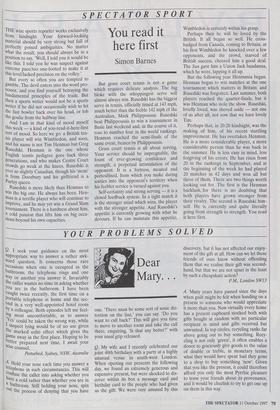SPECTATOR SPORT
You read it here first
Simon Barnes
THE wise sports reporter works exclusively from hindsight. Your forward-looking material should be very strong but full of Perfectly poised ambiguities. No matter What the result, you should always be in a Position to say, 'Well, I told you it would be like this. I told you he was suspect against extreme pace/too one-footed to make it at this level/lacked precision on the volley.' But every so often you are tempted to gamble. The devil enters into the word pro- cessor, and you find yourself betraying the fundamental principles of the trade. But then a sports writer would not be a sports writer if he did not occasionally wish to hit the fast bowler back over his head, or lob the goalie from the halfway line.
And I am in that kind of mood myself this week — a kind of you-read-it-here-first sort of mood. So here we go: a British ten- nis player will win Wimbledon, and soon, and his name is not Tim Henman but Greg Rusedski. Henman is the one whose English tennis pedigree goes back three generations, and who makes Centre Court Crowds go weak at the knees. Rusedski is ever so slightly Canadian, though his `mom' is from Doozbury and his girlfriend is a Purley queen. .Rusedski is more likely than Henman to win the big one. He always has been. Hen- Man is a terrific player who will continue to Improve, and he may yet win a Grand Slam tournament. There is a hardness about him, a. cold passion that lifts him on big occa- sions beyond his own capacities. But grass court tennis is not a game which requires delicate analysis. The big bloke with the whoppingest serve will almost always win. Rusedski has the biggest serve in tennis, officially timed at 143 mph, much better than the feeble 142 mph of the Australian, Mark Philippoussis. Rusedski beat Philippoussis to win a tournament in Basle last weekend and, in the course of it, rose to number four in the world rankings. Henman reached the semi-finals of the same event, beaten by Philippoussis.
Grass court tennis is all about serving. Your service should be impregnable, the fount of ever-growing confidence and strength, a perpetual intimidation of the opponent. It is a fortress, moated and portcullised, from which you make daring sorties into the opponent's territory when his feebler service is turned against you.
Self-certainty and strong serving — it is a closed feedback system. In a tight match it is the stronger mind which wins, the player with the stronger appetite. And Rusedski's appetite is currently growing with what he devours. If he can maintain this appetite, Wimbledon is certainly within his grasp.
Perhaps then he will be loved by the British. It all began so well. He cross- badged from Canada, coming to Britain; at his first Wimbledon he knocked over a few opponents, and the crowd, starved of British success, cheered him a good deal. The Sun gave him a Union Jack bandanna, which he wore, lapping it all up.
But the following year Henmania began. Henman began to win matches at the one tournament which matters in Britain; and Rusedski was forgotten. Last summer, both players reached the quarter-finals, but it was Henman who stole the show. Rusedski, briefly loved, was shoved aside — not one of us after all, not now that we have lovely Tim.
Perhaps that, in 20:20 hindsight, was the making of him, of his recent startling improvement. He has overtaken Henman. He is a more considerable player, a more considerable person than he was back in the summer. He is less easy in mind, less forgiving of his errors. He has risen from 20 in the rankings in September, and at the beginning of the week he had played 20 matches in 42 days and won all but three of them. There are two things worth looking out for. The first is the Henman backlash, for there is no doubting that both players have grown stronger from their rivalry. The second is Rusedski him- self. He is currently and quite literally going from strength to strength. You read it here first.


















































































 Previous page
Previous page